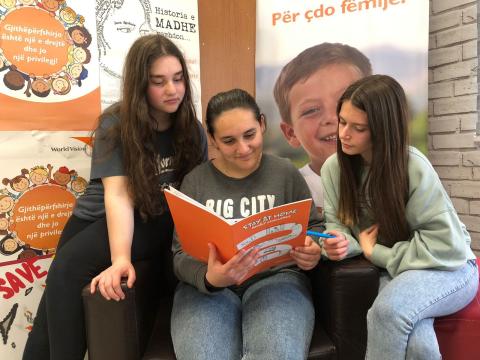Girls' movement to bring change

Irgesa, Adela and Sivesa are three young girls from Dibër that are trying to be the change they want to see in their community. As many of their peers, they say they have felt the differentiation society makes between boys and girls, but through their movement, they are trying to heal this mentality as much as they can.
“Empowered women, empowered children” study conducted by World Vision Albania also reflects these young girls’ concern, in which 464 children between the ages of 11-17 and 464 women (mothers) between the ages of 35-50 were interviewed in eight cities around the country. The findings of the study show that only 9% of women have access to civil rights, whereas 22% admitted to experiencing a form of violence. The study also found that women’s decision-making power in the household (HH) is limited and is only 56% due to prevailing patriarchal norms, where the husband’s opinion often dominates especially on financial decisions.
Speaking about challenges and difficulties girls face in Dibër, the three brave members of IMPACT groups and the REPORTER youth blog tell us about the “deep gender divide” in their city, as well as the steps they have taken and are taking alongside their peers to change this reality.
“Being a girl in Dibër means being surrounded by prejudice, hearsay and rumors. Many of the girls in our community have to be quiet and stay home all day. They are not easily allowed to talk back to anyone, they must keep quiet most of the time,” tells Irgesa. She states that changing this mentality is not easy.
Adela, her friend, says that gender equality is a fundamental human right and fundamental to a peaceful and prosperous world. According to her, many girls from Dibra are deprived of this right.
“Everything is different in the life of a girl from Dibër. In the morning, girls must wake up early and do housework, whereas boys don’t have to. A girl must think carefully what to wear to make sure it is up to society’s expectations, and she always has a strict curfew she shouldn't break,” continues Adela.
Sivesa shares the same concern. In her words, the prejudice against many girls doesn’t start during childhood or even adulthood, but it starts “in mother’s womb before you are even born”. She explains that girls are often seen less valuable than boys.
“You are judged by how you speak and what you wear, even for who you go out with. Many families will rarely celebrate the birth of a daughter, whereas they will eagerly await the birth of a son,” she says.
Irgesa, Adela, Sivesa, as well as the 94 other girls in IMPACT youth groups World Vision Albania works with in Dibra do not accept this reality. They have risen above the prejudice and mentality, and inspire their peers by setting an example. They openly speak about these topics to their parents, relatives, classmates and teachers, and have involved themselves in community-based movements to quell the biases and create equal opportunities for boys and girls. Some of these campaigns have focused on gender equality, internet safety, leadership and communication.
Many parents are improving their understanding of child development and the that equal treatment of men and women is essential. They are part of the “Celebrating Family” programme which trains them to build healthy family relationships. These initiatives have started to show a positive effect, but there is still much work to be done by institutions and families themselves.
The three girls state that fighting inequality requires dismantling social barriers. Adela, Sivesa and Irgesa want institutions, organisations and society itself to do more to create an environment where every girl and woman has the opportunity to show her full potential, where every girl and woman is heard, asked, treated equally and included in family or community decision-making.
“I hope that in the future, our norms and traditions will be so different from those we have today, that when we explain our own daughters our struggles, everything will sound like an old tale or even meaningless,” concludes Irgesa with a call to action.
Every one of us has a duty to accomplish and this role starts in our families, as well as in the relationships we build in school, workplace and society.
World Vision Albania works to empower girls and women by helping them plan and engage in projects that seek to bring societal change. We believe that healthy, educated and empowered women and girls are an important part in this process of change.